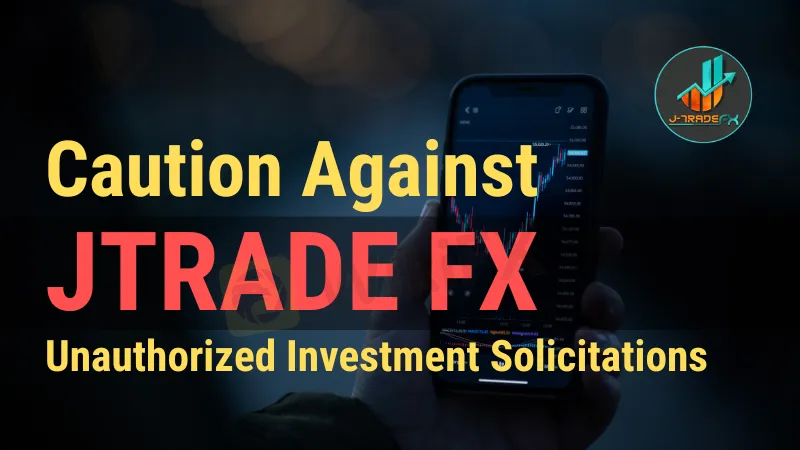简体中文
繁體中文
English
Pусский
日本語
ภาษาไทย
Tiếng Việt
Bahasa Indonesia
Español
हिन्दी
Filippiiniläinen
Français
Deutsch
Português
Türkçe
한국어
العربية
Caution Against JTRADE FX Unauthorized Investment Solicitations
Abstract:PH SEC warns against investing in JTRADEFX Foreign Exchange Service, an unregistered entity using a Ponzi scheme to lure investors.

The Philippines Securities and Exchange Commission (PH SEC) urgently informs the public about the activities of JTRADEFX / JTRADEFX FOREIGN EXCHANGE SERVICE. This entity, not authorized by the SEC, has been actively soliciting investments, particularly through social media.
JTRADEFX advertises various investment plans on its website and social media platforms, promising significantly high returns in short periods. The plans include:
Micro Account: 35% interest in 7 days.
Mini Account: 90% interest in 15 days.
Standard Account: 210% interest in 30 days.


Investments are collected through a specific Union Bank account, as provided by JTRADEFX.
The SEC's investigation reveals that JTRADEFX's offerings are classified as “investment contracts” under the Securities Regulation Code (SRC). Such contracts require a secondary license from the Commission, which JTRADEFX lacks. Initial checks confirm that JTRADEFX is not registered with the Commission as a corporation or partnership. Although JTRADEFX holds a Certificate of Business Name Registration from the Department of Trade and Industry, this does not authorize the company to offer or sell securities.
The scheme operated by JTRADEFX is identified as a “Ponzi Scheme,” a fraudulent system that pays returns to earlier investors using the capital of newer ones. This model is unsustainable and primarily benefits its top recruiters, posing a significant risk to later investors. The business model does not involve any legitimate means of profit generation, relying solely on the influx of new investors and the supposed trading expertise of JERALD BAWAAN, JTRADEFX's CEO.

Ponzi schemes are destined to fail, as they lack a sustainable method of generating income. When the flow of new investors dries up, such schemes collapse, leading to significant financial losses for participants. The SEC emphasizes that such schemes, being fraudulent and unsustainable, cannot be registered as securities, and entities involved in these practices will not be granted licenses.
Furthermore, investment fraud, including Ponzi schemes and other misleading tactics, is prohibited under the Financial Products and Services Consumer Protection Act (FCPA). Individuals who engage as JTRADEFX salespeople, brokers, agents, promoters, or recruiters may face legal consequences, including jail and penalties.
The public is strongly advised not to invest in JTRADEFX or similar entities. Caution is urged when dealing with individuals or groups promoting such investment schemes. Investing in unauthorized and unregistered schemes can result in significant financial loss and legal complications.
Related News:
For further information and guidance, the public is encouraged to contact the SEC directly. The Commission remains committed to protecting investors and maintaining the integrity of the financial market.

Disclaimer:
The views in this article only represent the author's personal views, and do not constitute investment advice on this platform. This platform does not guarantee the accuracy, completeness and timeliness of the information in the article, and will not be liable for any loss caused by the use of or reliance on the information in the article.
Read more

The Daily Habits of a Profitable Trader
Every professional trader follows a structured approach to ensure they are well-prepared, disciplined, and able to seize opportunities with confidence. Whether you are a seasoned investor or an aspiring trader, adhering to a robust daily checklist can significantly enhance your performance. Use this checklist to check if you are a qualified trader

Authorities Alert: MAS Impersonation Scam Hits Singapore
MAS scam alert: Scammers impersonate officials, causing $614K losses in Singapore since March 2025. Learn how to spot and avoid this impersonation scam.

Billboard Warns of Crypto Scams Using Its Name – Stay Alert!
Billboard warns against fake crypto scams using its brand. Learn how to spot fraud and protect yourself from fake promotions.

The Impact of Interest Rate Decisions on the Forex Market
Interest rate changes determine currency attractiveness, influencing capital flows and exchange rate trends. Understanding this mechanism helps investors navigate the forex market effectively.
WikiFX Broker
Latest News
The Withdrawal Trap: How Scam Brokers Lure Victims into Paying More
FCA to Investors: Think Twice Before Trusting These Brokers
Trump\s tariffs: How could they affect the UK and your money
Trump gambles it all on global tariffs he\s wanted for decades
TradingView Brings Live Market Charts to Telegram Users with New Mini App
Trump tariffs: How will India navigate a world on the brink of a trade war?
Interactive Brokers Launches Forecast Contracts in Canada for Market Predictions
Authorities Alert: MAS Impersonation Scam Hits Singapore
Stocks fall again as Trump tariff jitters continue
IG Group Acquires Freetrade for £160M to Expand UK Investment Market
Currency Calculator








